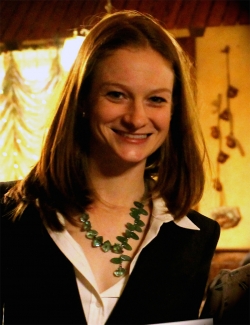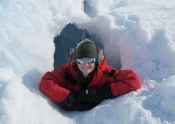By: Alexandra L. Giese, PhD Candidate in Earth Sciences at Dartmouth College

During the last week of February 2014, I had the privilege of representing the United States and Dartmouth College at the 2014 Model Arctic Council, a role-playing program with the same goals as the better-known Model UN: to expose students to high-level policy negotiations through experience and participation. The Model Arctic Council was held at the Northern Arctic Federal University (NArFU) in Arkhangelsk, Russia. Thirty graduate students from more than ten countries participated in simulated proceedings of the Arctic Council, a high-level intergovernmental forum for promoting cooperation, coordination, and interaction among the Arctic States, with the involvement of Arctic indigenous communities, on common Arctic issues.
The four-day program of the Model Arctic Council began with a day of lectures and round-table diplomacy discussions led by prominent government figures, including U.S. Embassy Public Affairs Officer Steven Labensky; Russian International Affairs Council Deputy Program Director Timur Makhmutov; and Lev Levit, senior researcher at the Arkhangelsk Scientific Centre of the Russian Academy of Sciences. Other lectures covered the history of the Arctic Council, international relations, and security strategies.
The following days involved simulations of the three types of meetings run by the Council: a biannual meeting for one of the six Working Groups, which implement research and projects related to specific interests such as sustainable development; the biannual meeting of Senior Arctic Officials; and the biennial meeting of Arctic Ministers (the Secretary of State represents the U.S. in this meeting). Each was a progressively higher-level meeting to which participants passed along information discussed and resolved at the lower-level meeting the previous day. The Arctic Council's Rules of Procedures were followed by student participants as they represented delegates from the eight Arctic Member States, six Permanent Participants groups, four of the six Working Groups, and three of the twelve non-Arctic Observers . Each role was assigned prior to the meeting, and students prepared written position papers as well as oral statements or presentations for the meetings.
In my role as chair of the Protection of the Arctic Marine Environment (PAME) working group, I was responsible for ensuring that environmental management, pollution control, and ecosystem protection issues entered the conversations. Specifically, I updated Senior Arctic Officials on the progress of a new Arctic Marine Shipping Plan, a collaborative sustainable tourism initiative, and potential special designation of Arctic marine areas.
The Model Council's task and final product was the "Arkhangelsk Declaration." Emulating those produced every two years at the Arctic Council Ministerial Meetings, this document highlighted progress and outlines future goals we agreed upon by consensus. The declaration summarized our work creating and designing initiatives to revitalize indigenous language, facilitate international electronic sharing of historical archives and data, stimulate product development within the reindeer herding industry, and address the incidence of suicide in northern communities. Overall, the discussions were engaging, the negotiations successful, and the resulting plan both compelling and achievable.
The exercise was also characterized by some of the challenges the real Council faces: miscommunications resulting from varying levels of English proficiency, gridlock due to conflicting interests and opinions on financial obligations, and vastly different relevance of issues to each country or participant. At the end, I left with a far better understanding of the operating procedures and current priorities of the Arctic Council than I could have acquired through lectures or reading. More importantly, however, I departed Arkhangelsk with a profound, almost humbling, sense of optimism about the potential for even greater international collaboration and the commitment of my generation of students to ensuring a profitable, peaceful, and thoughtfully developed future for the Arctic region.
I was able to attend the Model Arctic Council thanks to the generosity of Dartmouth's Institute of Arctic Studies at the Dickey Center for International Understanding and NArFu.
The Model Arctic Council program agenda is available as a pdf here. More information about the Arctic Council, its membership, and working groups is available here. Information about the Dartmouth IGERT program is available here. For more information, contact (Alexandra.L.Giese.GR [at] dartmouth.edu).

